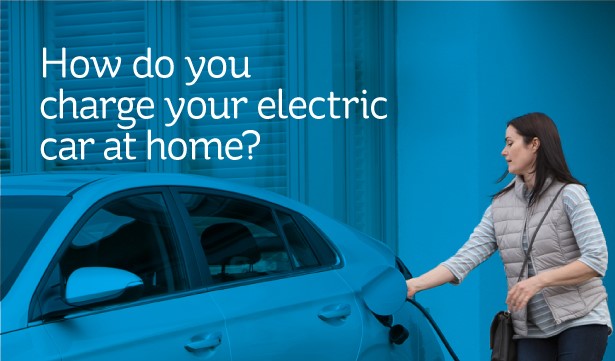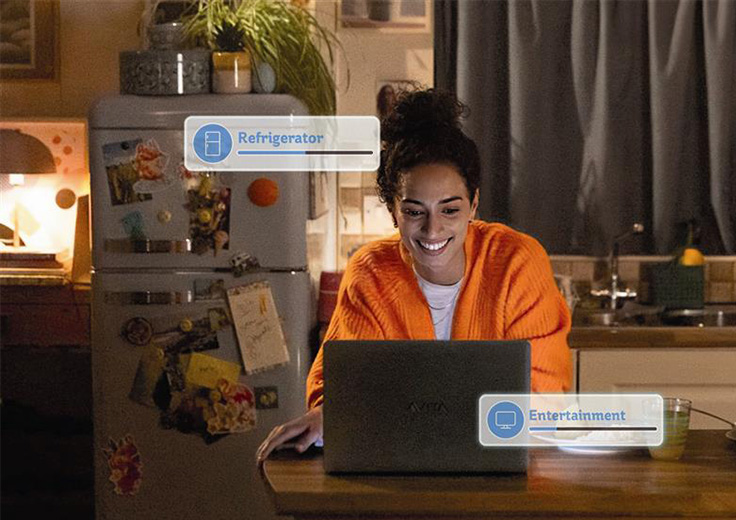5 frequently asked questions about charging your electric car at home

According to a recent survey, around 70% of electric car drivers do most of their charging at home. If you’re considering buying an electric car, you’ve probably seen the growing number of charge points around the country but you might have questions about charging your electric car at home.
So let’s answer those questions, starting with the obvious one.
How do you charge your electric car at home?
There are a few options, starting with simply plugging your car in to a standard socket. That might sound surprising but you really can get a cable that plugs directly from a standard three pin plug direct to your electric car. That means getting started on charging your car at home is as simple as charging any other battery-operated device.
With all that convenience comes a couple of caveats. Charging an electric car through a standard plug is the slowest charging method available. And unless you already have an outdoor plug near your driveway, plugging into a standard socket means running a cable out through an open window or door. It’s also important to point out that this method is not recommended as your primary charging method because standard sockets are not ideally suited to supplying high levels of power for a long time. Extension reels or cables should not be used at all, as they are not intended to carry full rated current for lengthy periods and can overheat.
The recommended option will be installing a dedicated charging point. These will be faster than a standard socket and can be installed right in your driveway for easy charging. They’re also very affordable at the moment with a grant of up to €600 towards the installation available from the Sustainable Energy Authority of Ireland.
Newer models of these units also typically offer smart features that allow you to track you’re spending and switch the charger on/off remotely, meaning a home charger will give you extra information and control, as well as the extra speed.
Where can I install a home charger?
The actual installation will need to be performed by a registered installer, who can assess your property and help you to decide the ideal location. The charger itself can be mounted on a wall in your driveway or on a wall on your house, so there are two key considerations here; distance to your car and the location of your electricity meter and fuse box. The greater the distance between the fuse box and the charger, the greater the cost to have the charger installed.
The charger needs to be connected to your standard electricity setup so having your meter and fuse box near where you park your car will keep things simple. If your house isn’t set up that way, you can still get a home charger but setup will take a little more work. The installer can provide the full details on what is needed to carry out the installation.
The standard charging cable used to charge the car is 5 metres (16’3”) in length, which should be more than enough for garage, carport or short driveway use. Longer cables and extensions for your existing cables are available if you need to reach a little further.
What about that SEAI Home Charger Grant?
If you’re thinking of getting a home charger, you need to know about the SEAI EV Home Charger Grant.
Your car must have a top speed of over 100kmh and a range of 100km. A plug-in hybrid (PHEV) must comply with the ‘top speed’ condition but have an on-battery range of over 20km and emit less than 75g of CO2 per kilometre. A list of eligible EVs and PHEVs can be found here.
The grant will only cover off-street installation on private or rented property (with permission of the lessor) and installation must be carried out by an electrician registered with Safe Electric Ireland. You should get grant approval from SEAI before proceeding with your charger installation as not having approval may mean that you won’t get your grant.
Okay, so how long does it take to charge an electric car?
It depends on your car and where you’re doing the charging. The quickest option is through the charging network, a fast charger will get you from 0-80% in around 30 minutes which is mainly used for topping up your battery when you are out on a long journey. For a 40kW battery a typical 7kW home charging station will charge an electric car from 0-100% over the course of around 3-5 hours. For cars with battery capacities over 60kW the charging time will be in the region of 6-8 hours. As mentioned above, you do also have the option to use a ‘trickle charger’ plugged into a standard socket, that will generally take 18 hours or more.
And, how much does it cost to charge an electric car at home?
That depends on when you charge the car. We recommend charging overnight on a night rate as this will give you the best value. On the current Electric Ireland night rate, charging a Hyundai Kona from 0-100% would cost around €6.29. That car has a WLTP range of 449km, so if you drive an average of 20km per day you would get a little over 22 days of driving from that €6. (The Irish average driving distance is around 14km per day according to CSO data) If you were to charge during the day, those same 22 days of driving would cost €11.94.By comparison, fuelling the most efficient diesel Hyundai Kona would cost around €29.20 to cover the same distance (WLTP 5.0 l/100km @ €1.30 per litre)
Charging at home is the most convenient and cost-effective way to charge an electric car, especially if you stick to charging at night. Most of all, it will give you peace of mind. With an electric car and a home charger you will never have to leave the house with less than a full tank.



